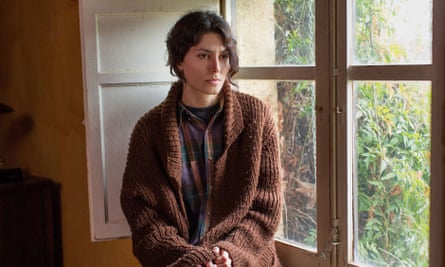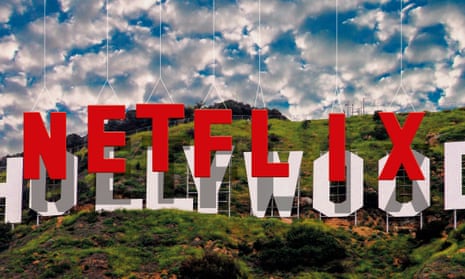At the Berlin film festival last February, Clare Binns took her seat for the premiere of a Spanish film that was generating a quiet buzz. She hoped it might play at Picturehouse Cinemas, the British chain of cinemas she runs. In the film, La Enfermedad del Domingo (Sunday’s Illness), an abandoned daughter confronts her well-to-do mother in a remote mountain village. The film’s director, Ramón Salazar, has a knack for epic melodrama that has drawn comparisons with the work of Pedro Almodóvar.
“It was a fantastic film, and one that is made to be seen in cinema,” says Binns. “But it was only when I was sitting there watching it that I noticed the logo.”
Alongside the name of the film’s Spanish production company, there rose the ubiquitous – and increasingly divisive – mark of Netflix. The streaming giant, which this week announced it has more than 125 million global subscribers, had financed the film. Binns immediately knew this drastically reduced her chances of getting anywhere near it. “We went straight to the producer to try to work out a way – in Spain, they are doing a theatrical release – but Netflix didn’t want to do anything else,” she adds.
Instead, Netflix will add La Enfermedad del Domingo to its dizzying carousel of content in June, where users may enjoy it at home. “I don’t object to Netflix as a business,” says Binns, who is a subscriber herself. “But for a film like that to show just on a platform and not the big screen is just so depressing. It’s a disgrace.”
Binns’ feelings echo an epic tussle in the global film and TV industries. Last week, a spat between Netflix and the European cinema establishment erupted a month before the Cannes film festival. The company, which declined to answer questions, only occasionally shows its movies in handfuls of cinemas, partly to make them eligible for awards. Even then, the films are made available for home viewing at the same time, a sacrilege in the world of cinema. Now the industry fears for the future of a business model – and an art form.

The Netflix logo was greeted with boos at Cannes last year during screenings of Okja and The Meyerowitz Stories, acclaimed films that were eligible for the Palme d’Or. “When we selected these two films, I thought I could convince Netflix to release them in [French] cinemas,” Thierry Frémaux, Cannes’ artistic director, told the Hollywood Reporter last month. “I was presumptuous; they refused.” After further protests, Frémaux banned Netflix from competition.
Last week, Ted Sarandos, the chief content officer at Netflix, breezily announced that Netflix would skip Cannes rather than show films out of competition. The festival had “set the tone”, he told Variety. “We are choosing to be about the future of cinema. If Cannes is choosing to be stuck in the history of cinema, that’s fine.”
Cultural chasms have opened along the Croisette before, but this time the old guard is facing a rapidly evolving digital beast that can afford to dismiss the most prestigious festival in the business. Sarandos was so relaxed withdrawing that he found time to needle Frémaux. After the festival chief had also banned selfies on the Cannes red carpet (they “tarnish the quality and tempo of the ascending of the steps”), Sarandos wondered “what other advances in media Frémaux would like to address”.
At the heart of the tension is Netflix’s growth this year. According to the new figures, the company added 7.4 million new subscribers between January and March. In the next few weeks, more than half of its viewers will be outside the US. (Only China, Crimea, North Korea and Syria lie beyond its reach.) Revenue has also grown 43% in the past year to $3.7bn (£2.6bn). Moreover, after two decades of sharing other people’s films and TV shows, gathering priceless consumer data in the process, Netflix is financing its own content in unprecedented quantities. This year, the company is spending $8bn on content, including 700 original TV shows and 80 movies, more than twice as many as any other studio – and almost five times the BBC’s annual spending on television.
But to what extent is Netflix’s tightening grip on our screens irresistible, and how does the company’s culture – built around its sage-like founder and CEO, Reed Hastings – explain its success? Because, apart from the protectionist cries of cinephiles, Netflix is facing a coming onslaught from new- and old-world rivals. Streaming services, such as Amazon, Hulu and Apple, are investing fast, while – perhaps most significantly – Disney is pulling its own content from Netflix before its planned launch of a rival streaming platform late next year.
“I think it’s going to be fascinating to watch,” says US journalist Gina Keating, author of Netflixed: The Epic Battle for America’s Eyeballs. When the book was published in 2012, that battle had been Netflix v Blockbuster, followed by one with HBO. Netflix had started as a DVD rent-by-post operation in 1997, mushrooming in the early 2000s. But Hastings, a Boston-born computer scientist, was biding his time. In 2002, Netflix said in the government filing attached to its first sale of shares: “When appropriate, [we] believe that we are well-positioned to offer digital distribution to our subscribers.” This was three years before YouTube was born, when dial-up internet was still common and when Netflix had just 600,000 DVD subscribers. (And it was five years before that, it is worth noting, that Hastings had decided to call his company Netflix.)
“He is why I wanted to write the book,” Keating says of Hastings. “I had watched him consistently make call after call that nobody on Wall Street thought were good ideas – and he just knew. He just didn’t care when his share price tanked and I’d never seen a CEO like that.” Keating says the data Netflix has amassed – what its viewers like, how long they watch, when they watch – is “everything”. She adds: “They constantly have a finger on the pulse, and the demand curve that they have observed allows them to project into the future in a way that I don’t know anyone in any other industry can do … I just don’t think anybody knew what effect this model would have on how that content is created.”
Gareth Neame has watched that transformation during more than 20 years in British television, having worked at both the BBC and independent production companies. He commissioned series including Spooks, State of Play and Hustle. In terms of funding, he says, “one way or another, a producer usually got to about £1m an hour”.

That model endured until Neame made Downton Abbey for ITV. It marked a watershed for British drama abroad, particularly in the US, where PBS was a joint producer – and for a new form of lucrative collaboration. “The UK broadcasters are still spending up to about £850,000 an hour today, but, rather than that forming 80% or 90% of the budget, it’s now more like 50% or even 30%,” Neame says.
The model shifted again when Netflix and others began bulk-buying content to satisfy its subscribers. Producers had yet another revenue stream and they began financing shows in anticipation of a streaming deal, pushing budgets and quality higher still. This increased Netflix’s subscriptions – and its own spending power once it began making its own shows. (The Crown, made for Netflix by the British production company Left Bank Pictures, has a budget of more than £10m an episode.) The centre of gravity has shifted and, for TV and film-makers, Netflix has become an attractive home.
In 2015, BBC Two and BBC America showed the first series of The Last Kingdom, a big-budget drama based on Bernard Cornwell’s Saxon Stories. Neame had made it for the BBC, but Netflix came calling and found the show an enthusiastic global audience. “The first season didn’t break through on BBC America, but it did on Netflix in the US,” Neame says. So Netflix replaced BBC America for the second series, co-producing it with the BBC and Carnival. This month, Carnival announced that the third series of The Last Kingdom will be an exclusive production for Netflix. “Their mission seems to be to back storytellers and let them get on with it,” Neame says.
For fledgling film-makers, that support can often be the difference between making a film and not. For years, Adam Randall, a British director, struggled to find funding for iBoy, a sci-fi teen thriller adapted from a 2010 young adult novel. By 2015, he and his producer had raised just $600,000. Then Netflix got hold of the script. “We got on the phone in early 2016 and an hour later they were on board,” Randall says. “They raised the budget to roughly $1.5m.”
iBoy, released on Netflix in January last year, was the first British Netflix Original film. Had he made it without Netflix, with half the budget, Randall thinks the film, a London-set genre piece for teens, might have struggled to win the interest of distributors or festivals. “To get to a young audience with Netflix was perfect and it has been seen by a much wider international audience than I could ever have hoped for,” he says.
Yet, beyond the premium originals Netflix now churns out, reruns of shows such as Friends, The Office and Gossip Girl still drive as much as 80% of the service’s traffic, according to analysis last October by the research firm Nielsen.

As Netflix commissions so much, partly to keep its virtual shelves filled in case other content providers follow Disney out the door, do producers and directors fear getting lost in the crowd? James Murdoch, CEO of 21st Century Fox, said last year that Netflix and Amazon were “where shows go to die”. Netflix doesn’t reveal audience figures, even to programme-makers. “There’s a bit of a mystery to it, but if it works they say: ‘It works and we want [more of] it,’” Neame says. “It’s about living in the modern age of engagement on Twitter and Facebook, and the ways people consume now. It’s still nice to get your artwork on to the front of the Radio Times, but that’s not as important as it was five years ago.”
For Netflix itself, under-the-radar content is as much a part of the business model as hits such as House of Cards and Stranger Things. “While it might be inconceivable for an old-style network to greenlight a series that appeals to 0.5% of its viewers, for Netflix, if that series is the reason that 0.5% choose to subscribe, that is enough to justify it,” Joshua Gans, an Australian economist and expert in competition policy, said in the Harvard Business Review last October.
Disney’s streaming service, for which it is making Star Wars TV shows, appears to set the studio against Netflix in an epic battle for eyeballs, not least after its planned acquisition of 21st Century Fox. But not every industry observer sees it that way. “The reality is that Amazon, Hulu and even Apple are already further along than Disney,” says Rich Greenfield, a Silicon Valley analyst at San Francisco trading firm BTIG. “I think it’s a highly entrepreneurial culture that’s about a willingness to sacrifice near-term profits to win long-term.” Legacy media companies have neither the stomach nor culture to truly take on that fight, Greenfield believes.
Nor do they have Netflix’s data, which will require a big additional investment in old-school marketing for Disney and others. And Netflix is big in that game, too. In January, the company said it would increase its marketing budget to $2bn. This month, it was reported that Netflix is bidding more than $300m for a billboard company in the heart of Hollywood. The reported move, which neither party commented on, appeared to reflect Netflix’s rampant growth strategy – but also the devil-may-care attitude that was evident in Cannes.
“If it’s true, it would seem to confirm the idea in Hollywood that Netflix is taking over the world,” Keating says of the billboard ploy. The company’s culture has been an object of speculation for years, fuelled in part by its publication, in 2009, of a “freedom and responsibility” slide show for would-be employees (in January, the company had 5,500 employees globally). Last year, it updated and shortened the document, setting itself apart from the Silicon Valley archetype of free lunches and ping-pong tables with a tougher, more grownup atmosphere. Managers frequently judge teams against a “keeper test”; if Jim, say, were planning to leave, would you fight to keep him? If not, employees are “promptly and respectfully given a generous severance package”. “They describe themselves as being like a pro sports team,” Keating adds.
Several former Netflix employees declined to contribute to this article. But where will Netflix’s win-at-all-costs mentality take it – and audiences? Hastings himself has committed only to doing more of the same, but many watchers see an eventual route into live TV, news and sports broadcasting as streaming services continue to grind down old broadcasters and channels. Netflix and other streaming services will become TV as we know it. “I also think we’ll see more experimentation with virtual reality and user-generated plot twists,” Keating says, pointing out the advantages a tech-first company would have in doing so.
In the meantime, Netflix has work to do if it wants to make friends in the industries it is shaking up. The company’s logo may not be featuring at Cannes next month, but its executives will be there, buying yet more content. “I think everyone is frightened about the new world order,” says Binns at Picturehouse Cinemas, who will also be at the festival. “I just hope people start to recognise that we need to be talking to each other and working out a way of making sure we’re not killing the cinema.”
- This article was amended on 18 April 2018 to correct the spelling of Ted Sarandos. An earlier version referred to Ted Sandaros.

Comments (…)
Sign in or create your Guardian account to join the discussion